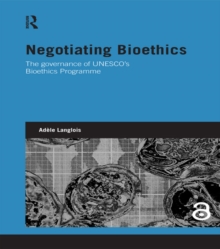
The International Legal Governance of the Human Genome PDF
by Chamundeeswari Kuppuswamy
Part of the Genetics and Society series
Description
The human genome is a well known symbol of scientific and technological progress in the 21st century. However, concerns about the exacerbation of inequalities between the rich and the poor, the developing and the developed states, the healthy and the unhealthy are causing problems for the progress of scientific research. The international community is moving towards a human rights approach in addressing these concerns.
Such an approach will be piecemeal and ineffective so long as fundamental issues about economic, social and cultural rights, the so-called second generation of human rights, are not addressed. This book argues that, in order to be able to meaningfully apply a human rights framework to the governance of the human genome, the international human rights framework should be based on a unified theory of human rights where the distinction between positive and negative rights is set aside.
The book constructs a common heritage concept with the right to development at its core and explores the content of the right to development through rational human rights theory. It is argued that the notion of property rights in the human genome should be placed within the context of protecting human rights, including the right to development. The concept of common heritage of humanity, contrary to the widely held belief that it is in opposition to patenting of gene sequences, supports human rights-based conceptions of property rights.
This book fills a gap in the literature on international legal governance of the human genome will provide an essential reference point for research into the right to development, development issues in bioethics, the role of international institutions in law making and research governance.
This is book nine in the Genetics of Society book series. It is vital to promote this book via the Cavendish list
Information
-
Download - Immediately Available
- Format:PDF
- Pages:224 pages
- Publisher:Taylor and Francis
- Publication Date:09/06/2009
- Category:
- ISBN:9780203929407
Information
-
Download - Immediately Available
- Format:PDF
- Pages:224 pages
- Publisher:Taylor and Francis
- Publication Date:09/06/2009
- Category:
- ISBN:9780203929407










